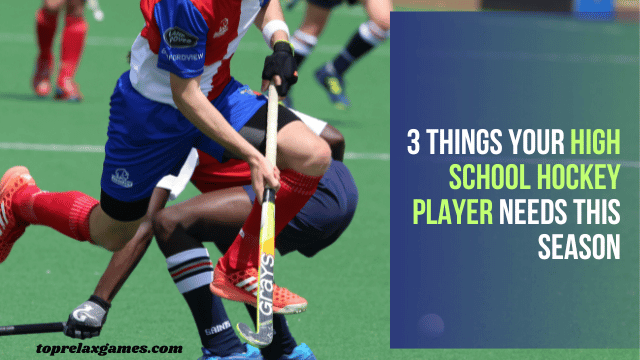The winter season is here, so it’s time to start prepping for high school hockey! If you have a high school hockey player in your family, you know the right equipment and preparation are important. Preparing for the upcoming season requires more than finding the perfect pair of skates and hockey sticks. Here are three essential things your high school hockey player needs this season to have the best chance of success. From proper training to protective gear, these three items are must-haves for any serious hockey player.
Proper equipment
When it comes to high school hockey, having the right equipment is essential for success. Your player must have gear that fits properly and meets safety standards. One of the most important pieces of equipment is a well-fitting helmet that protects the head from potential injuries. It should have a secure chinstrap and be properly certified.
Additionally, a good pair of skates is crucial for their performance on the ice. Skates should fit comfortably, with enough room for the player’s toes to wiggle, but not so loose that they cause blisters or discomfort. The blade should be sharp and well-maintained for optimal control and maneuverability.
Another key piece of equipment is the hockey stick. This is a player’s most important tool on the ice, and it’s important to find the right stick for their style of play. Whether they prefer a lighter stick for quick puck handling or a heavier one for powerful shots, make sure it’s the correct size and has the right amount of flex.
Lastly, don’t forget about the little details. Accessories like hockey stick tape may seem insignificant, but they play a significant role in a player’s performance. Properly taped sticks provide better grip, control, and feel, helping your player have an edge on the ice.
Investing in proper equipment for your high school hockey player ensures their safety and enhances their performance. Remember, the right gear can make all the difference between a good game and a great one.
Strength and conditioning
Strength and conditioning are crucial aspects of high school hockey. To excel on the ice, your player must be physically fit and have the stamina to endure intense games and practices. This means focusing on both strength training and cardiovascular conditioning.
Strength training is essential for developing the power and explosiveness to make quick moves and deliver strong shots. Your player should incorporate exercises like squats, lunges, and deadlifts to build lower body strength. Upper body exercises like push-ups, pull-ups, and bench presses will help with stickhandling and checking.
In addition to strength training, cardiovascular conditioning is vital for game endurance. Hockey is a fast-paced sport that requires constant movement. Your player should engage in activities like running, biking, or using the elliptical machine to improve cardiovascular fitness. High-intensity interval training (HIIT) is also beneficial, mimicking the short bursts of energy required during hockey games.
It’s important to remember that strength and conditioning should be done under the guidance of a knowledgeable coach or trainer. They can design a program tailored to your player’s specific needs and goals, ensuring they progress while reducing the risk of injury. By prioritizing strength and conditioning, your high school hockey player will be better equipped to handle the physical demands of the sport and have a greater chance of success on the ice. So, encourage them to hit the gym, work hard, and watch as their performance improves throughout the season.
Mental toughness training
Mental toughness is a key attribute every high school hockey player must develop to excel. Hockey is a fast-paced and physically demanding sport that requires players to make split-second decisions, handle pressure, and stay focused amidst distractions. This is where mental toughness training comes into play.
Mental toughness training helps players develop a solid mindset to overcome challenges and perform at their best, even under high-pressure situations. It involves various techniques and strategies to improve concentration, confidence, and resilience. One effective strategy is visualization. Players can enhance their confidence and reduce anxiety by visualizing success and positive outcomes. This technique involves mentally rehearsing their performance, imagining themselves making successful plays, and picturing themselves achieving their goals.
Another important aspect of mental toughness training is developing effective coping mechanisms for adversity and setbacks. Players learn to stay resilient and bounce back from mistakes or failures. They are taught strategies such as positive self-talk, reframing negative situations, and focusing on the process rather than the outcome.
Additionally, goal-setting is a crucial component of mental toughness training. Setting specific,
measurable, attainable, relevant, and time-bound (SMART) goals helps players stay focused, motivated, and committed to their progress. Players can track their improvement and maintain their drive throughout the season by setting short-term and long-term goals.
Overall, mental toughness training is as important as physical training in high school hockey. It equips players with the mental skills to perform under pressure, stay focused, and maintain confidence. With the right mindset, your high school hockey player can reach their full potential and have a successful season.
Remember, a successful season is not just about wins and losses but also about the growth and development of the player both on and off the ice. So, support your player, encourage them to work hard, and watch as they excel in the upcoming season.




